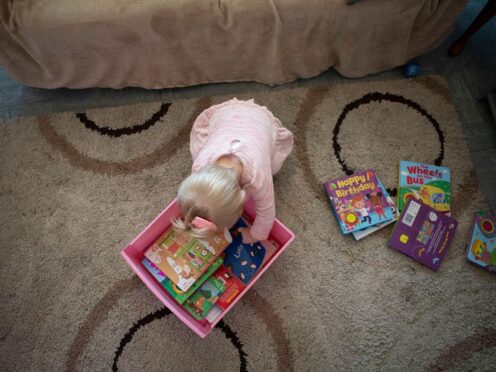
Child poverty in working households has increased by more than 1,300 children a week since 2010, according to a new study.
A report released on Tuesday by the Trades Union Congress (TUC) says the number of kids growing up in poverty in working households has increased by 44% – that is over 900,000 children in the UK – between 2010 and 2023.
The TUC says that in 2023, 3 million children in working households in the UK lived below the poverty line.
Children growing up in poverty in working households now account for 69% of all children in poverty and 24% of all children in working families.

According to the TUC, the cause is a “toxic combination” of wage stagnation, rising insecure work, and social security cuts.
The TUC report indicates all of these factors have had a “devastating impact” on family budgets.
TUC general secretary Paul Nowak said the numbers show that Britain needs an “economic reset” this General Election.
“No child in Britain should be growing up below the breadline. But, under the Conservatives, we have seen a huge in rise in working households being pushed into poverty,” Mr Nowak said.
“A toxic combination of pay stagnation, rising insecure work and cuts to social security have had a devastating impact on family budgets.
“Reducing child poverty must be a priority in the years ahead.”
He added that Britons urgently needed a government “that will make work pay”.
The TUC also used data from the Office of National Statistics to track wage growth since 2010, determining that if wages grown at the same rate since before the Tories took power, the average worker would be more than £14,000 a year better off.

Chief executive of Action for Children Paul Carberry echoed the findings by the TUC.
“Sadly, here is yet more evidence that for too many families facing hardship, work doesn’t pay – and hasn’t for a long time,” he said.
“These depressing figures mirror our own analysis last year, which found an average low-income family, where every parent was already working full time, would need to squeeze in an extra 19 hours a week to escape the breadline – equivalent to working an eight-day week.”
He called on those in Westminster to have an “honest conversation about why so many children are growing up poor in this country”.
He also urged Britons to “confront the myth that work alone is a passport out of poverty.”
“This General Election, we want to see all political parties commit to ending child poverty in the UK once and for all. That means urgent action to fix the basic adequacy of social security so that families can at least meet their essential needs – starting with ditching the cruel two-child limit,” he said.
“We also need a wider programme of reform to break down work barriers, improve job quality, and offer security so that work provides a more reliable route out of poverty.”
Separate analysis from the TUC shows that the number of people in insecure, low-paid work has increased by nearly 1 million during the Conservatives’ time in office, now sitting at 4.1 million Britons.

Enjoy the convenience of having The Sunday Post delivered as a digital ePaper straight to your smartphone, tablet or computer.
Subscribe for only £5.49 a month and enjoy all the benefits of the printed paper as a digital replica.
Subscribe